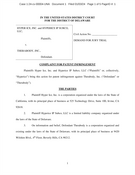-
Parus Holdings Inc. v. LG Electronics, Inc. et al Do not docket. Case consolidated into W19CV432. DC
- 6:19-cv-00437
- W.D. Tex.
- Judge: Alan D. Albright
- Filed: 07/23/2019
- Closed: 12/20/2019
- Latest Docket Entry: 05/24/2023
- PACER
- Docket updated daily
1
Plaintiff
2
Defendants
1
Accused
Product
2
Patents-in-Suit
151
Days in
Litigation
-
Parus Holdings Inc. v. LG Electronics, Inc. et al Do not docket. Case consolidated into W19CV432. DC
- 6:19-cv-00437
- W.D. Tex.
- Judge: Alan D. Albright
- Filed: 07/23/2019
- Closed: 12/20/2019
- Latest Docket Entry: 05/24/2023
- PACER
- Docket updated daily
Cause of Action
Willful Patent Infringement
Market Sector
Mobile Communications and Devices
Assigned Judge
- Patent Information
